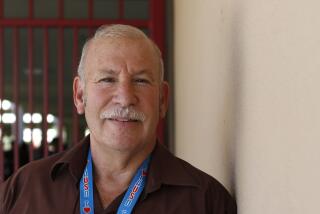Soboroff Offers Own School Breakup Idea
- Share via
Mayoral candidate Steve Soboroff said Thursday that, if elected, he will push for a plan to break up the Los Angeles Unified School District into 25 to 30 districts, each governed by an elected board of education.
Soboroff said he would appoint a commission to prepare a master plan of districts that would be responsive at the neighborhood level.
“The overwhelming majority of people I talk to want to live in a city where you can greet a member of your local board of education at the grocery store or a PTA meeting,” Soboroff said.
In aligning himself with the growing ranks of those favoring a breakup of the 711,000-student district, Soboroff went far beyond any current proposal to divide or reorganize the massive district.
The reorganization plan proposed by interim Supt. Ramon C. Cortines would create fewer than half as many districts. It calls for 11 mini-districts. Each would have a superintendent and a parent council to make many decisions, but ultimately would still answer to the Board of Education.
In the San Fernando Valley, where secession sentiment is strong, another proposal calls for two large districts.
Immediate reaction to Soboroff’s proposal was tepid.
Stephanie Carter, the co-chairwoman of the Valley breakup group, said she was skeptical, for example, that such a plan would be consistent with state law.
Carter said her group, called Finally Restoring Excellence in Education, crafted its two-district plan by applying state law that requires new districts to preserve a racial and ethnic balance and provide a fair division of resources.
Soboroff said his idea is to form a panel of experts and citizens to design school districts that would work and then seek any legislation necessary to make them possible.
Soboroff said he spoke Thursday to state Sen. Richard Polanco (D-Los Angeles), who has introduced a bill calling for a statewide commission to prepare a breakup plan.
Soboroff said he and Polanco agreed that their proposals could be woven together to accomplish their mutual goal. Polanco did not return a call seeking comment.
Beyond its implications for schools, Soboroff’s move also has ramifications for the mayor’s race.
Many political analysts see Soboroff’s challenge in the current campaign as similar to the one that faced Richard Riordan in the early 1990s: how to first secure a relatively conservative base and then move beyond that to receptive moderates. In Soboroff’s case, as in Riordan’s, that essentially means building strong, early support in the voter-rich San Fernando Valley, where sentiment for school breakup is thought to be strongest.
Soboroff’s endorsement of a breakup plan could earn him early favor in that part of Los Angeles, an important first step in establishing himself as a serious candidate. What’s more, to the degree that breakup sentiment resonates in other parts of the city, Soboroff also could reap benefits elsewhere.
On the other hand, many observers question Soboroff’s ability to reach beyond his natural base. Soboroff is a multimillionaire Republican, hardly the most attractive political credentials in a heavily Democratic city with a politically powerful labor movement.
Soboroff has sought to emphasize his civic and community work with parks as well as schools, which may help soften his party affiliation and make him better received outside the Valley.
Soboroff’s school proposal carries a potential political risk. By endorsing a breakup of the school district, he is taking a different tack than Riordan, who has consistently favored giving the school board, four of whose members he helped elect last year, time to revolutionize the school system.
On Thursday, however, Riordan said he supports what Soboroff is trying to do. The mayor said he believes that smaller districts work better, but that the breakup isn’t feasible. “He’s taking on a mighty task,” Riordan said. “If he can accomplish it even partially, he will be doing a lot of good for kids.”
Opposition could come from the teachers union.
Day Higuchi, president of United Teachers-Los Angeles, immediately branded Soboroff’s statement a simplistic political ploy.
“The challenge to Mr. Soboroff is the same as the challenge to anyone else: to explain exactly how that is going to improve the education of students,” Higuchi said.
More to Read
Sign up for Essential California
The most important California stories and recommendations in your inbox every morning.
You may occasionally receive promotional content from the Los Angeles Times.












